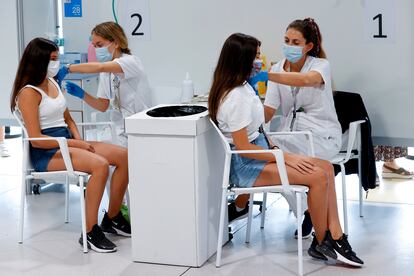Coronavirus restrictions to remain in Spanish schools, with half of high school students due to be vaccinated
Experts say that mask-wearing will have to be maintained during the academic year, but are confident that infections will be kept low despite the more-contagious delta variant


The upcoming school year in Spain, the third that will be affected by the coronavirus pandemic, will get going in September with nearly half of students aged 12 to 18 fully vaccinated against Covid-19 and a large part of the rest with their first dose. The scenario will be very different from a year ago, when the vaccines were yet to be rolled out. Now there are more than 30 million Spaniards with full protection. In schools, however, there will be no great changes for now in terms of day-to-day restrictions.
The central government and the country’s regions – who are in charge of their education systems – will meet on Wednesday to debate and revise the plans agreed last May for the coming academic year. The expectation is that many of the safety measures – such as masks for all students over the age of six – will be maintained. Class ratios, however, which were reduced due to the health crisis, are likely to return to pre-pandemic levels.
My advice would be that all schools and high schools do more or less the same that they did last yearSantiago Moreno, head of infectious diseases at Ramón y Cajal Hospital (Madrid)
These plans could be threatened by the delta variant of the coronavirus, however, given that it is more contagious than previous strains. But experts are, for now, confident that they will be sufficient to see Spain repeat the success of last year, when the schools were kept open throughout the 2020-2021 academic year.
“My advice would be that all schools and high schools do more or less the same that they did last year,” explains Santiago Moreno, the head of infectious diseases at the Ramón y Cajal Hospital in Madrid. “It is still early to withdraw measures such as masks and physical distancing. The circulation of the virus is too high and while the current [vaccination] percentages will help, it will be necessary to have nearly the entire 12 to 19 population vaccinated and a lower incidence before they can be relaxed.”
According to the Health Ministry, 55.4% of the 3.9 million 12- to 19-year-olds in Spain have already received their first dose of a Covid-19 vaccine
Elena Vanessa Martínez, the president of the Spanish Epidemiology Society (SEE), points out that the good management of the situation by Spanish schools that began a year ago must stay in place for the upcoming year. “It was admirable, and a lesson for all of us,” she states. “Schools and high schools showed us that if things are done well, the results are good. Now we have a more contagious variant, but it is spread in the same way. So if we apply the same measures, the virus will still be unable to circulate in our places of learning.” She complains, however, that class ratios will be returning to pre-pandemic levels.
According to the latest Health Ministry report, which was released on Friday, 55.4% of the 3.9 million 12- to 19-year-olds have already received their first dose of the Pfizer-BioNTech or Moderna Covid-19 vaccines. The gap between the shots in the case of the former is 21 days, and 28 days in the case of the latter. The forecast is that around half of this age group will have been fully vaccinated when they return to school, or at least will be during their first days back in the classroom. As for the remainder, many will have got their first shot, which begins to offer partial protection after the 10th day.
While precise data are not available, there is likely to be a higher percentage of students with full protection among the nearly two million university and vocational training students aged over 18. While the age groups for these students and those in the government’s vaccination strategy do not coincide, the over-20s who have already received their first vaccine dose – and will have been fully vaccinated by the time they return to the classroom – exceeded 69% according to Friday’s report.
There have been no vaccines approved so far for the under-12s, who account for nearly 4.5 million school students across Spain. “Children aged six to 12 should, for now, maintain measures such as masks to avoid the virus circulating among them and passing it on to vulnerable seniors,” explains Santiago Moreno. “While a large number of their parents and grandparents are already vaccinated, there are large groups of the population that still need to be protected. They are the immunosuppressed and the 5% of people who do not develop immunity despite having received the vaccine.”
None of the specialists consulted is willing to make a prediction as to when protection measures such as masks can be scrapped
The head of infectious diseases at the Ramón y Cajal Hospital cites his patients as an example. “Nearly half are people who have received the two doses, 20% just one and 30% who had not been vaccinated yet,” he explains. “It’s not that the vaccines aren’t working – on the contrary, they have saved thousands of lives. But with the high current incidence, if you add the immunosuppressed to the 5% who have not been protected by the vaccine and those who have not received their two doses, that is a lot of people who are still vulnerable.”
Juan Barranco, the spokesperson for the Spanish Society of Preventive Medicine, Public Health and Hygiene (SEMPSPH), points out that “every time that we have thought that we have gained ground against the virus and measures have been relaxed, it has responded with a new wave of infections.” Despite this, the specialist is optimistic. “We have the experience of the previous academic year, where there were very few infections and outbreaks, which shows us that things were done well. It’s true that the delta variant is more contagious, but I hope that if things are done similarly well, the circulation levels of the virus in education centers will be able to be kept under control.”
None of the specialists consulted is willing to make a prediction as to when protection measures such as masks can be scrapped. First, they agree, the start of the school year will have to be analyzed, and from there decisions will have to be taken according to the data collected inside and outside the classroom.
The education community began the last academic year with uncertainty, given that the more than eight million students in the country had not been in the classroom since mid-March. The ministries of Health and Education – in coordination with the regions – established a strict protocol that saw fewer students in each class in order to increase social distancing, more teachers were hired, classrooms were ventilated at all times, all children over six had to wear masks and the whole class was confined when a positive case was detected within a bubble group. The approach was successful.
Within Europe, only Sweden and Spain managed to keep their schools open for the entire academic year. Experts consulted previously by EL PAÍS pointed to the country’s climate as contributing to this success, given that windows could be kept open. Another factor was the social consensus over the importance of face-to-face teaching.
This Wednesday, Education Minister Pilar Alegría will meet with regional education chiefs with the “objective, reiterated on a number of occasions by the minister, for face-to-face teaching to be the norm for all education stages and levels,” according to the invitation to the summit. During the last academic year, many students aged over 12 alternated their classes between home and school.
“Face-to-face”
In May, Universities Minister Manuel Castells, who will meet with deans and regional chiefs before the start of the academic year, announced his ministry’s plans. “The coming academic year will depend on the delta variant and social discipline,” he said at the time. “The idea is for it to be face-to-face with the precautionary measures that we have, because we are not going to scrap mask-use, windows will be open, there will be social distancing… The pandemic is not over.”
Last year there was a mix of face-to-face and remote classes at Spanish universities, with considerable differences from campus to campus. An early outbreak of 168 infections after an Ibiza-themed party at a hall of residence in Valencia saw classes suspended at the Valencia Polytechnic (20,000 students). But in the end, while there have been infections at similar halls of residence, there have been no major outbreaks on Spanish campuses.
With reporting by Elisa Silió.
English version by Simon Hunter.
Tu suscripción se está usando en otro dispositivo
¿Quieres añadir otro usuario a tu suscripción?
Si continúas leyendo en este dispositivo, no se podrá leer en el otro.
FlechaTu suscripción se está usando en otro dispositivo y solo puedes acceder a EL PAÍS desde un dispositivo a la vez.
Si quieres compartir tu cuenta, cambia tu suscripción a la modalidad Premium, así podrás añadir otro usuario. Cada uno accederá con su propia cuenta de email, lo que os permitirá personalizar vuestra experiencia en EL PAÍS.
¿Tienes una suscripción de empresa? Accede aquí para contratar más cuentas.
En el caso de no saber quién está usando tu cuenta, te recomendamos cambiar tu contraseña aquí.
Si decides continuar compartiendo tu cuenta, este mensaje se mostrará en tu dispositivo y en el de la otra persona que está usando tu cuenta de forma indefinida, afectando a tu experiencia de lectura. Puedes consultar aquí los términos y condiciones de la suscripción digital.








































